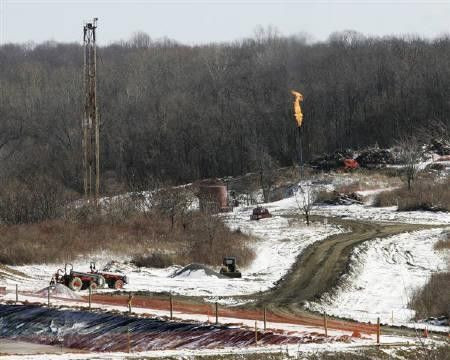Pennsylvania General Assembly Votes to Impose Fees on Natural Gas Companies

The Pennsylvania Legislature, after a full day's debate, narrowly approved Wednesday a bill that would levy annual fees against natural gas companies for each natural gas well they drill in the Marcellus Shale.
The bill passed the Republican-controlled House just before 4 p.m. Wednesday by a vote of 101 to 90, sending the bill to Gov. Tom Corbett, also a Republican.
The Republican-controlled Senate passed the fee law Tuesday by a vote of 31 to 19.
Corbett will have 10 days to sign the bill.
After long negotiations and a lot of hard work, we have reached a consensus on how to address the impacts in the Marcellus Shale regions, Corbett said in a statement. I am very pleased with the cooperative spirit shown by the General Assembly and their staffs while working to resolve this complex issue. I look forward to signing this legislation into law.
Pennsylvania joins Ohio and Maryland as states considering a fee structure on natural gas drilling, while New Jersey contemplates an outright ban on the practice. New York is still reviewing comments to its environmental impact statement and proposed industry regulations, and could open the state up to hydraulic fracturing this year. All these states are seeking to tap a potential bonanza from gas in the so-called Marcellus Shale basin.
The bill will require natural gas companies to pay an annual fee for 15 years for every well drilled that subsequently extracts more than 90,000 cubic feet of natural gas.
If a well produces less, it would not be subject to a fee. The fees will reflect market gas prices and gradually decline as the 15 years progress. In the first three years, fees can range between $25,000 and $60,000.
The fees would be attached to wells that for the most part hydraulically fracture, or frack, rock by injecting thousands of gallons of water, sand and chemicals into the ground. The fees are expected to generate close to $200 million for Harrisburg this year, Bloomberg reported. Proceeds will be given to counties and municipalities in which drilling takes place.
To date,10,020 permits have been issued to companies since 2005 when the Marcellus Shale play took off. Since then, 4,676 wells have been drilled with 1,646 wells actively producing natural gas in the region.
The legislation is being praised by Pennsylvania Republicans as a means to reel in the natural gas industry and tap into its profits.
Counties will have the final say on imposing a fee, but if enough municipalities within a county want to implement fees, they can override the county's decision. If a county opts out of the fee structure, it will not receive any money generated by the fees imposed in other parts of the state.
Pennsylvania Democrats criticized the law saying the fee structure is too lax on natural gas companies.
© Copyright IBTimes 2024. All rights reserved.




















